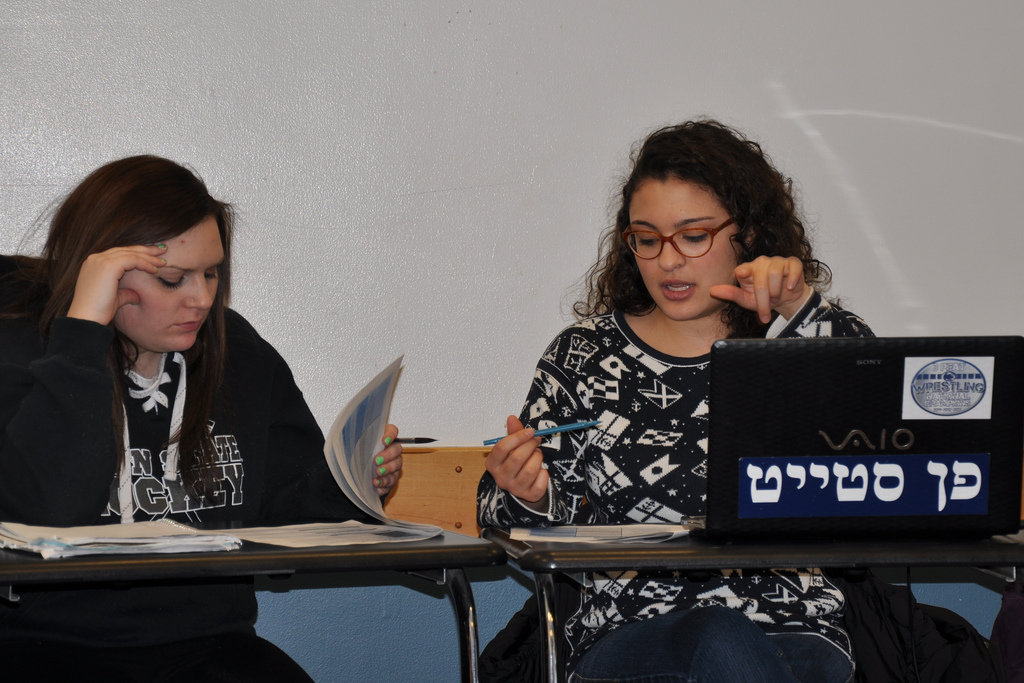One of the values we hope to integrate into the new General Education curriculum at Penn State is a recognition of the importance of public deliberation. Deliberating in public is difficult; it requires certain intellectual and ethical habits that are often underdeveloped in a culture saturated by hyperbole and stark dichotomies.
These intellectual and ethical habits can only be developed with practice, so rather than advocate for the value of the habits of deliberation in the abstract, those of us involved with reforming the General Education curriculum at Penn State have sought to put those habits into practice as we undertake the very process of General Education reform.
To that end, we developed a General Education Deliberation Guide and a Facilitator’s Guide based on the Kettering model of deliberation used in their very successful National Issues Forums.
As with the Kettering model, we ask participants in the deliberation exercise to advocate for each of three options to ensure that everyone understands the values of each approach. Of course, the final curriculum will not be one or another of the options developed, but some compromise of the best aspects of each.
These were the options we developed:
- Exploration: General Education is primarily about exploration. Students should be given the opportunity to explore various subjects and ideas in a wide and diverse set of fields. Breadth of knowledge is critical to the success of students in the 21st century.
- Integration: General Education is not simply about learning facts, but integrating knowledge for different perspectives into an integrated understanding of a particular theme or subject. In the 21st century, students will need to be able to draw on a diversity of perspectives and ways of knowing in order to make successful decisions relating to their careers, communities and the wider world around them.
- Skills: General education should be about giving students the skills they need to thrive in a 21st century economy. Students need to learn how to read and write effectively, how to communicate in various digital and traditional modes and how to understand and process enormous amounts of data and information and apply that to concrete professional situations.
Last Thursday, we piloted the deliberation model with John Gastil’s Communication, Arts and Science 409 course on Democratic Deliberation.
It was remarkable to see the way the students advocated for each of the three options and then turned to look critically at the limitations of each. John did an excellent job of ensuring that if they were critical of one option, they needed to propose a solution to the critique to improve the option.
As students began to gravitate toward the integration option, John noted this to the group and then invited them to think together more critically about that option. The result was not that they came to reject it (in fact it was the groups preference by a wide margin), but it required them to think about its limitations and to suggest ways those limitations could be proactively addressed.
As I participated in the process, I was amazed at the way the structure of the conversation moved students to a very sophisticated level analysis and critique. Here are some images of from the discussion:
As we roll out this model of deliberation across the university, we will be gathering feedback on the General Education website about the results of the process in the hope that this information will itself inform the decision making process in which the General Education Task Force is engaged.


“In the 21st century, students will need to be able to draw on a diversity of perspectives and ways of knowing in order to make successful decisions relating to their careers, communities and the wider world around them”
a welcome development no doubt but not the traditional domain of academic focus/testing (at least not in the humanities and most of the social sciences) which tends to be geared towards fit to academic endeavors, how will these skills which can be transferred/applied to non-academic setting/projects be taught and how will the teaching/learning be tested in relation to such external settings?
Dirk, this is an important question. The Kettering model of deliberation requires participants to take a stand that emphasizes one dimension over another in order to thematize and lay bare tradeoffs so people can have a broader discussion of what they value.
I mention that because the question you raise would likely arise in the course of the discussion, once the three options are “on the table” so to speak.
It seems to me that students will need to be given opportunities to experience how different disciplinary perspectives draw out different aspects of a given theme. Beyond this, students will need to be challenged to bring the insights they gain from that multi-disciplinary education to their internships, study abroad experiences, volunteer work and even their academic scholarship.
We are developing a robust program of engaged scholarship at Penn State that could well help us empower students to do just this. Still, it is a real shift and we’ll need faculty willing and able to help students integrate their learning into the real world in these ways.
yes the “willing and able” is of course always tricky especially with folks who are so comfortably established with/in their current roles and skill-sets, getting them to embrace the anxiety and all that comes with moving away from our habitualized modes is always hard.
And in many ways the usual institutionalized socialization of academics is in some ways geared towards selecting and shaping folks who are amenable to adopting fairly set norms, who are given to predictability/stability, an interesting counter-point/example to this I think is in work like:
http://installingorder.org/2014/02/06/teaching-the-public-understanding-of-science-with-ancient-aliens/